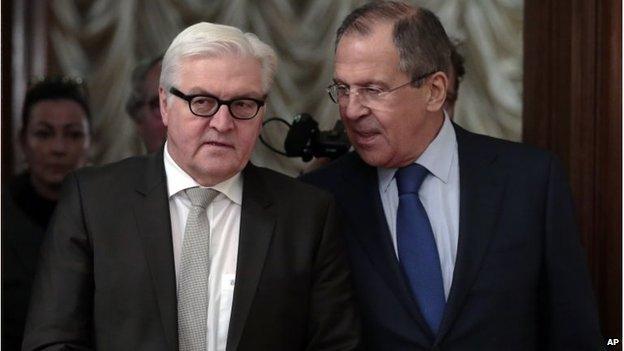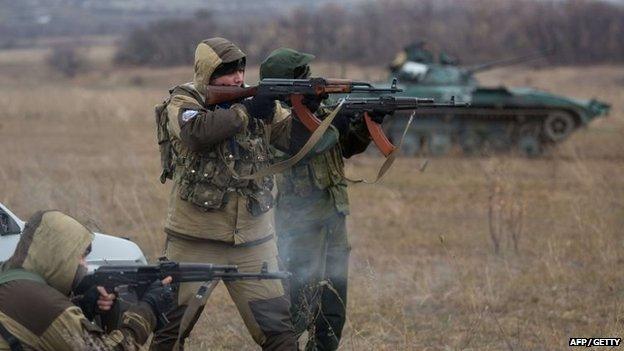Ukraine crisis: Russia demands guarantees from Nato
- Published

Frank-Walter Steinmeier (L) told Sergei Lavrov that Europe was at a crossroads over Ukraine
Russia has called for "a 100% guarantee that no-one would think about Ukraine joining Nato", President Vladimir Putin's spokesman has told the BBC.
Dmitri Peskov added that Nato's gradual approach towards Russia's borders had made Moscow "nervous".
Earlier, Mr Putin said the US would never "subdue" Russia over Ukraine.
Germany's foreign minister said Europe was heading for "confrontation instead of cooperation", amid warnings of a Russian build-up on Ukraine's border.
During a joint news conference in Moscow with Russian Foreign Minister Sergei Lavrov, Frank-Walter Steinmeier said that as fighting escalated in east Ukraine he could see "no grounds for optimism".
The minister also urged Russia to abide by the Minsk ceasefire agreement.
Historic promise

Nato has accused Russia of having a strong military presence among rebels in eastern Ukraine
Nato has warned of a serious Russian military build-up in rebel-held territory in eastern Ukraine and on Russia's side of the border.
But Mr Peskov countered by accusing Nato of breaking a historic promise by gradually approaching Russia's borders.
He said the alliance was "attempt[ing] to break the... balance of power".
In a televised meeting earlier, Mr Putin told a group of pro-Kremlin activists that the US wanted "to subdue us, solve their problems at our expense. They want to dominate and influence".
To applause he added: "No-one in history ever managed to achieve this with Russia, and no-one ever will."
Mr Putin said that US and EU sanctions against Russia ran contrary to these countries' own interests and that Russia - whose currency is suffering because of the sanctions - would see a boost in its industries.
On Monday the EU agreed not to increase sanctions against Moscow.
The West has long accused Russia of direct involvement in Ukraine, something which it denies.
In March the EU imposed sanctions on the country over its annexation of Crimea.
These were followed by further EU and US sanctions after Russia was claimed to be arming separatist rebels and sending Russian fighters into eastern Ukraine.